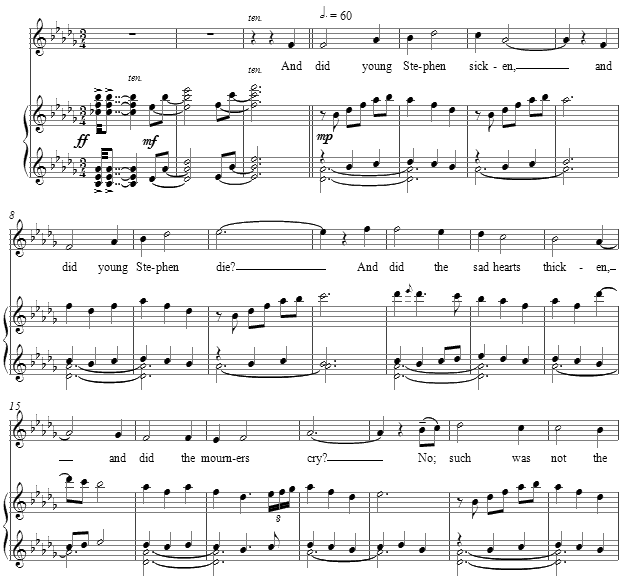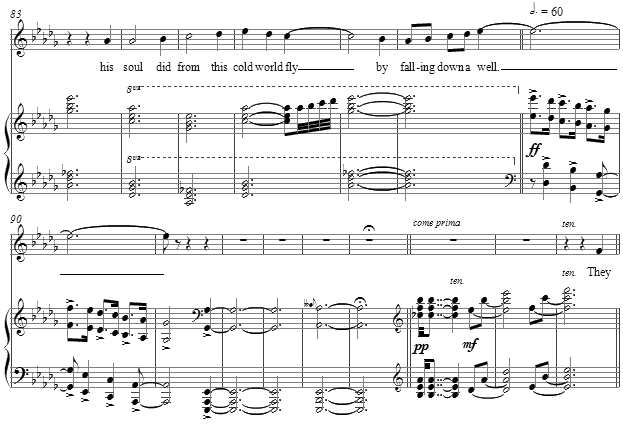Music and Texts of GARY BACHLUND
Vocal Music | Piano | Organ | Chamber Music | Orchestral | Articles and Commentary | Poems and Stories | Miscellany | FAQs
Ode to Stephen Dowling Bots, Dec'd. - (2007)
Mark Twain
for medium voice and piano
And did young Stephen sicken,
And did young Stephen die?
And did the sad hearts thicken,
And did the mourners cry?
No; such was not the fate of
Young Stephen Dowling Bots;
Though sad hearts round him thickened,
'Twas not from sickness' shots.
No whooping-cough did rack his frame,
Nor measles drear, with spots;
Not these impaired the sacred name
Of Stephen Dowling Bots.
Despised love struck not with woe
That head of curly knots,
Nor stomach troubles laid him low,
Young Stephen Dowling Bots.
O no. Then list with tearful eye,
Whilst I his fate do tell.
His soul did from this cold world fly,
By falling down a well.
They got him out and emptied him;
Alas it was too late;
His spirit was gone for to sport aloft
In the realms of the good and great.[ 5 pages, circa 2' 40" ]
Mark Twain
The above historic photograph, cropped for the purposes of this web page, is from 1905, a negative of gelatin on nitrocellulose roll film. Samuel Langhorne Clemens (1835-1910), wrote under the pseudonym or "pen name" of Mark Twain. He was an American humorist, satirist, writer, and lecturer. Twain is most noted for his novels Adventures of Huckleberry Finn, which has since been called the "Great American Novel," and The Adventures of Tom Sawyer which drew on his youth in Hannibal, Missouri. Twain is also known for his quotations. During his lifetime, Clemens became a friend to presidents, artists, leading industrialists, and European royalty. He enjoyed immense public popularity, and his keen wit and incisive satire earned him praise from both critics and peers. American author William Faulkner called Twain "the father of American literature." Mark Twain’s first important work, The Celebrated Jumping Frog of Calaveras County, was first published in the New York Saturday Press on November 18, 1865.
Mark Twain's pseudonym comes from his experience as a steamboat pilot on the Mississippi, wherein depths were "marked" as they were with sailing ships, by dropping a line to the bottom and calling out the crucial measure to the pilot.
Mark Twain's parody is of that form of obituary poetry which was popular in the late nineteenth century. Twain's fictional character, Huckleberry Finn, tells of an obituary poem by the deceased Emmeline Grangerford (who dies before her fourteenth birthday according to the author) and as printed in the Presbyterian Observer.
"Buck said she could rattle off poetry like nothing. She didn't ever have to stop to think. He said she would slap down a line, and if she couldn't find anything to rhyme with it she would just scratch it out and slap down another one, and go ahead. She warn't particular, she could write about anything you choose to give her to write about, just so it was sadful. Every time a man died, or a woman died, or a child died, she would be on hand withher `tribute' before he was cold. She called them tributes. The neighbors said it was the doctor first, then Emmeline, then the undertaker--the undertaker never got in ahead of Emmeline but once, and then she hung fire on a rhyme for the dead person's name, which was Whistler. She warn't ever the same, after that; she never complained, but she kind of pined away and did not live long."
The setting of this poem-parody nonetheless deals with death, and the ignominious death of "falling down a well" gives grief to those who love Stephen. Therefore, with the advice given by composer and conductor Don Ray (CBS Studio City and COTA Symphony in Los Angeles) that every character needs a "requiem," the setting is meant to be both silly and serious.
A reminiscence of a clanging bell announces this "obituary." What follows is light-hearted in spirit and in waltz time and tempo.
The mourners are represented by a change in the brighter feeling of a major tonality, and with a shift in the metrical feet, if only for a moment, before a return to the story telling by way of negative images coming first.
The mundane death is set up by a slowing of the harmonic rhythm, and then illustrated by the violent falling gesture leading back to a return to the opening strophe's themes. The clanging bell is now distant in time, at the comic retelling of this mundane tragedy.
Mark Twain's more serious and lovely epitaph for his wife's grave is titled Warm Summer Sun.
The score for is available as a free PDF download, though any major commercial performance or recording of the work is prohibited without prior arrangement with the composer. Click on the graphics below for this piano-vocal score.



